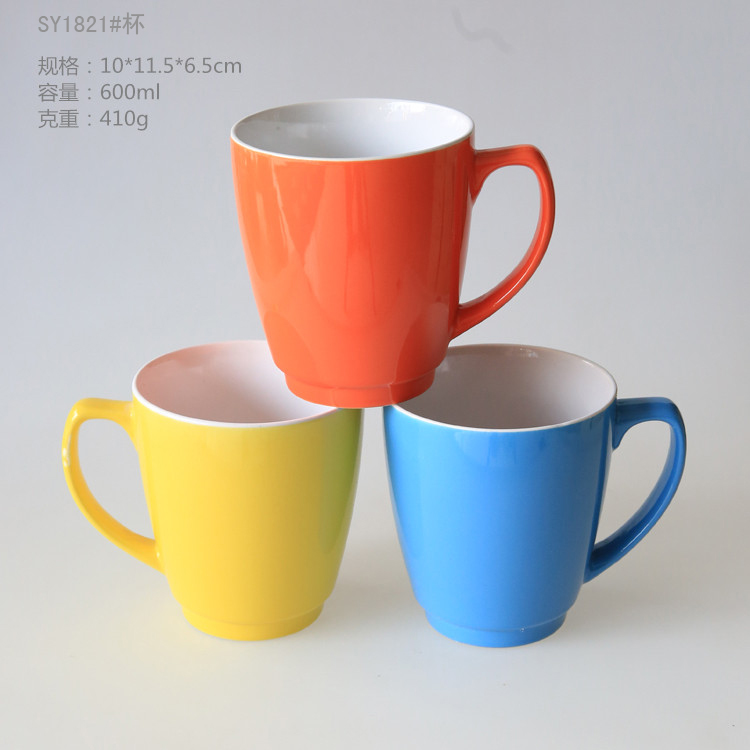Ceramic Mug Group, Most of the ceramic coffee mugs that we commonly use are
color glazed mugs. Whether it is ceramic mugs or
cappuccino coffee cup and saucers, all of them come with a layer of glaze. Some coffee mugs come with a pattern on the body and bottom of the mug, and the pattern is mostly an applique process. Today, we discuss the most common customized The production process of ceramic color glazed coffee mugs.
Companies customize coffee mugs based on demand (either customer demand or the company's own demand). The customization includes: cup shape, size, capacity, color, and handle and lid. Xinxiang Ceramics Factory will start the formal production after confirming the demand with the buyers.
1. Prepare the blank clay
The raw material of the clay is made of quartz, feldspar, kaolin and water, through grinding.
2.Cupping production
Before we use semi-automatic lathe press, the new mold will be installed on the molding machine, first of all, the mold debugging (need to pay attention to: the new mold needs to wait for drying before using), and then cut the blank clay into the mold, press the lathe press handle, the machine head will fall into the mold. Handle, the machine head will fall into the mold rotation, billet system production is complete. 2023, Xinxiang ceramic factory installed a new fully automatic car table molding machine. 20 cups made at the same time, and the process does not require manual operation. In addition, the cup handles are usually made by grouting (which takes about 10-15 minutes to set). (It takes about 10-15 minutes to solidify and mold).
3. Washing and trimming
After drying, the mugs and handles are washed and trimmed. Currently, we have installed a fully automatic washing and trimming machine. After drying the mug body on the washing table, grinding edge. The handle needs to be manually trimmed.

4.Drying and assembling
After waiting for the mugs and handles to dry, they are assembled. The pressed blanks need to be left for 5-10 minutes for the blanks to harden. Remove the handle from the mug after it has solidified and molded. First, flatten the ends of the handle, then correct the excess clay on the handle. Finally, hold the handle in your hand and dip it into the clay, sticking the handle to the body to form the mug. and the body of the mug are glued together to form a complete ceramic mug. It takes about 20-30 minutes to dry the finished mug (increase the blowing force and temperature to speed up the drying process).
5. Glaze
Common mug type, the most common glaze technique is to dip the glaze. The specific operation of glaze dipping is divided into: manual glaze and machine glaze. Color glaze mug in the glaze link, according to the single-color glaze and double-color glaze, glaze techniques are different. To the ceramic mug glaze, but also to make a careful Fine study, so that the glaze is adapted to the requirements of the ceramic body, which is called the glaze formula. Decide a glaze formula, consider a lot of factors, should mainly grasp the following three points:
5.1 As the glaze can not be separated from the body and the existence of a separate, therefore, in the glaze research must first master the physical and chemical properties of the body, that is, the chemical composition of the body. Expansion properties, into boiling humidity and finished product performance requirements and so on. Among them, the glaze and billet expansion Coefficient of expansion of the glaze and billet with the appropriate, is the glaze after firing fixed on the surface of the billet good or not the main conditions. If the expansion coefficient of the glaze is smaller than the expansion coefficient of the blank, the glaze layer is peeled off during cooling; if the expansion coefficient of the glaze is larger than the expansion coefficient of the blank, the glaze layer is cracked during cooling. If the coefficient of expansion of the glaze is greater than the coefficient of expansion of the billet, the glaze layer will crack during cooling, and the product may even be damaged when excessive stress is generated between the billet and glaze.
5.2 The requirements for the glaze itself must be clearly defined, such as whiteness, transparency, chemical stability and mechanical properties.
5.3 Attention must be paid to the purity of the raw materials for the glaze. Because the raw materials combined impurities, such as iron, cobalt compounds for the whiteness of the glaze and dielectric properties, etc. will have a great impact.
6.Calcination
According to the color of glaze and demand, decide the temperature of calcination. In practice, the main observations are the temperature, sulfur and carbon content.
The ceramic mugs covered by the glaze are also known as color-glazed mugs. Color glazed mugs are superbly stable and aesthetically pleasing. The glaze is derived from ore and no toxic substances are added during the glazing process. Therefore, color glazed cups can be used in both microwave and dishwasher.
In recent years, with the rapid development of science and technology, the production technology of daily-use ceramics industry is also developing rapidly, some traditional backward equipment and complex production processes are being eliminated, replaced by isostatic pressure molding, automatic trimming and other intelligent, automated Advanced equipment and simple process, connecting the compact equipment and production lines. Ceramic industry is a typical labor-intensive industry, with the development of the economy and labor costs continue to rise, by improving the production process of intelligent, automated, thus improving the daily-use ceramic industry's Production efficiency, become the future development trend of daily-use ceramic industry.